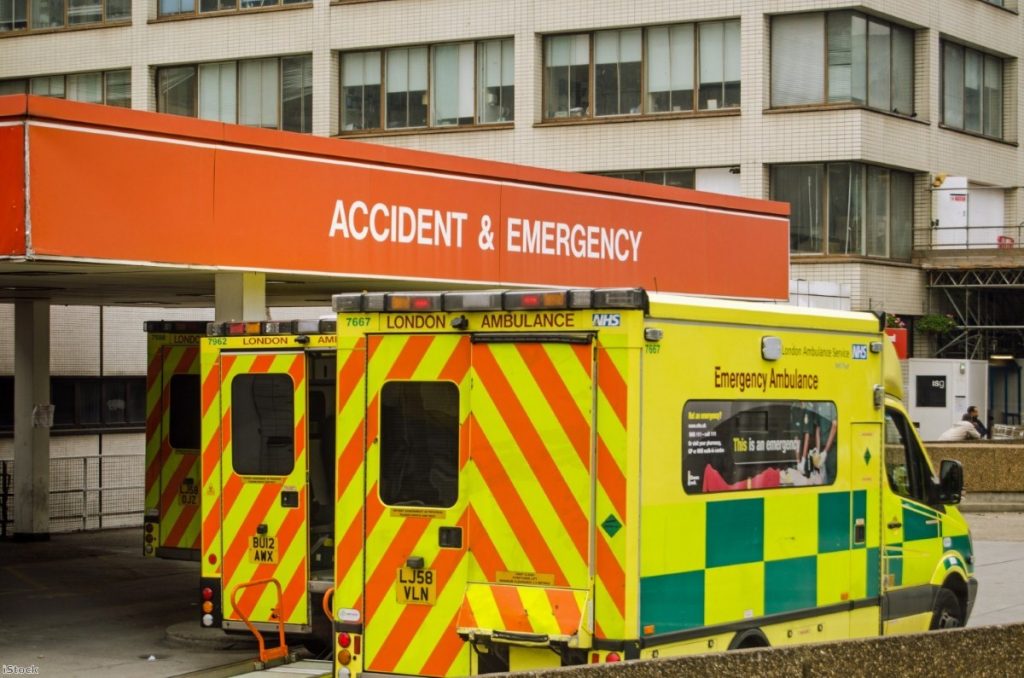The impact of Theresa May's "hostile environment" for undocumented migrants is particularly visible in healthcare. Across the country, those who need help – including pregnant women and people with spreadable diseases – are being deterred from accessing vital care because of fears of immigration enforcement.
In January, NHS Digital signed a 'memorandum of understanding' to give the Home Office access to patients' personal information. But data was being shared even before this agreement was made, with the Guardian reporting that 8,000 records were handed over to the Home Office in 2016 alone.
This took place amid a backdrop of rhetoric from ministers – including May herself – about an attack on so-called 'health tourism'. People increasingly became afraid to seek medical treatment.
One woman walked into a Doctors of the World health clinic in June. She'd escaped from the Grenfell Tower fire in North Kensington, but because of fears of being deported she wouldn't go to hospital to be checked over. She was also too afraid to contact the local authority about housing so was staying on friends' sofas.



Lu Hiam a health advisor at the organisation, which runs clinics for undocumented migrants, says that Grenfell was a stark example of the impact the hostile environment is having.
"We heard about people with smoke inhalation who were told they needed to go to hospital but just wouldn't go," she says.
"There needs to be trust and confidentiality between doctors and patients but health workers can no longer say 'don't worry, this is confidential'. We can't offer that reassurance anymore."
Staff at the Doctors of the World clinics fear the situation is getting worse and are hearing that people are even afraid to use their services, let alone the NHS.
"We saw one person with diabetes who was relying on their medication being sent here from Zimbabwe," Dr Suntharamoorthy says. "It wasn't turning up regularly so his condition was being badly managed.
"We're very worried that the situation is getting worse and that more people are being pushed underground."

Another major issue is the charges made by the NHS for people who are not entitled to free treatment. This is already acting as a deterrent for many people and the rules are about to get a lot tougher.
From October, patients will be expected to pay the charges in full before any treatment is carried out. As reported by Politics.co.uk last week, this is also being extended to NHS community services and could include services like school nursing.
The government's guidance on how to implement the new rules states that service providers have an obligation to "undertake reasonable enquiries" to determine if charges should be made. Although the document reminds those carrying out the checks not to "practice racial or nationality profiling" or "cherry-pick which patients to question", there are already concerns about how this will work in practice.
One father of a new-born baby recently received a letter from his local hospital demanding to know if his eight-day-old child was entitled to free healthcare. The parents wondered if they'd received the letter due to the mother's foreign-sounding maiden name. The hospital quickly told the family to disregard the letter, but it highlights the difficulties surrounding the policy. And this is before the new rules even come into force.
Seriously @LNWH_NHS what’s this about? Are you racially profiling my (UK-born and resident) wife’s maiden name? @DocsNotCops @Jeremy_Hunt pic.twitter.com/Ejq929fOFg
— Nik's T-Shirts (@NikTShirts) September 16, 2017
The organisation Asylum Matters is worried that the changes could stop refugees and asylum seekers from using preventative measures, such as community mental health services and health visiting. It's a concern shared by the National AIDS Trust, who say that the regulations will result in a "greater burden of health inequality" for migrants and could have a severe impact on individual and public health.
There are also worries that medical professionals will find it difficult to correctly judge the entitlement of those with complex immigration cases.
Dr Rebecca Farrington is a GP with a special interest in mental health. She says that even after 12 years of working closely with asylum seekers, she often finds it hard to establish their status.
"Discussing this topic can provoke distress and dissociation," she says. "Status can change frequently and therefore this conversation needs to happen at every contact."
"They show me letters from the Home Office that are difficult for me to decipher and I sometimes need to have a conversation with their solicitor to work out their status. It is stressful, confusing and time consuming."
Even non-NHS services which receive NHS funding will be expected to follow the new charging rules. This will include many charities whose services are aimed specifically at the very people who will be affected by the changes.
"It's totally unreasonable to make charities ask their patients about their immigration status and charge for care," Lucy Jones, head of the UK programme at Doctors of the World, says.
"The government is expecting charities to do the work of a border force."
There is currently very little clarity about how the new rules will be enforced. None of the healthcare professionals contacted by Politics.co.uk could say with any certainty which organisations would be expected to follow them or how healthcare workers would identify which patients should be asked to provide evidence. But they were all agreed on just how dangerous the policy is.
As with so much of May's 'hostile environment' agenda, these new regulations are ill-thought out and short-sighted. But worse than that, they are cruel and dangerous.
Natalie Bloomer is a journalist for Politics.co.uk. You can follow her on Twitter here.
The opinions in politics.co.uk's Comment and Analysis section are those of the author and are no reflection of the views of the website or its owners.









